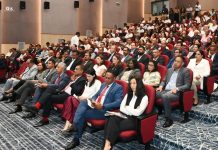Africa-Press – Mauritius. As Africa Goes Digital, Can the Law Keep Up?
Africa’s digital economy is growing at an unprecedented pace, powered by advances in fintech, e-commerce, and artificial intelligence. But while businesses race ahead, a key question remains: can Africa’s legal system keep up?
To meet the demands of this new era, the continent must invest in a future-ready legal workforce, professionals who understand both the law and the complexities of the digital world. From data protection to intellectual property in tech, the landscape is shifting fast.
Strategic mentorship is proving to be one of the most powerful tools to prepare the next generation of lawyers. Legal institutions and firms across Africa are being called upon to develop frameworks that not only teach legal fundamentals but also digital fluency.
To unpack this evolution, we spoke to Dr. Tunde Okewale OBE, an award-winning barrister at Doughty Street Chambers and founder of Urban Lawyers, a UK-based legal charity focused on access to legal education.
He advocates for mentorship models that combine legal rigor with digital exposure, linking experienced professionals with young legal minds to co-create Africa’s legal future.
Kigali’s $100M Cable-Car Project Set to Redefine Urban Mobility
Rwanda is positioning itself as a pioneer in smart urban transport with the launch of Sub-Saharan Africa’s first urban cable-car system in Kigali.
Backed by a $100 million investment, including support from the African Development Bank, the project aims to cut traffic congestion, lower carbon emissions, and create jobs—all while improving access for underserved communities.
Designed as a sustainable solution for rapidly urbanizing African cities, the cable car is a bold step toward green, inclusive infrastructure.
From Banana Waste to Biodegradable Braids in Kenya
In Kenya’s banana-rich highlands, farmers are doing more than harvesting fruit—they’re harvesting innovation.
Local entrepreneurs are transforming banana stems, usually discarded as waste, into biodegradable hair braids. This eco-friendly alternative is tapping into Africa’s booming beauty industry while tackling plastic pollution and creating new sources of income.
The initiative is a powerful example of circular economy in action, turning agricultural by-products into profitable, sustainable ventures.
For More News And Analysis About Mauritius Follow Africa-Press







